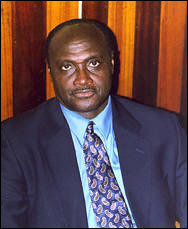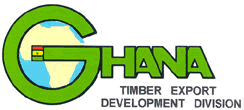
| 
 | 
Interview with
Mr. Samuel Kwasi Appiah,
Managing Director
Contact :
P.O.Box 515, Takoradi - GHANA
Tel: (233 31) 229 21/2
Fax: (233 31) 233 39
|
Could you give us a brief historical background of your company?
Our company which is now the Timber Export Division is part of the Forestry Commission. It used to be the Timber Export Development Board which was an offshoot of the Timber Board in 1985. This board was setup primarily to promote the sale of timber outside Ghana.
After the change of name have the objectives also changed in any way?
We started with promotion, now we are in the development of the Industry. We are to help modernize the Industry to make sure that it moves downstream and produces value added products. In doing this, we provide technical support to the industry, develop skills and provide market intelligence to the Industry.
Who are the shareholders?
It is 100% Government owned.
Do you have any plans for privatization?
We have ceded some of our functions, notably marketing and promotion, to the private sector. As I said earlier, we are involved in providing technical support to upgrade skills and to provide market intelligence to the Industry. Maybe in the next 5 years or more when the private sector has developed the capacity to do that then in line with the governments privatization policy some of the functions will be privatized.
Could you tell us what has been the development in the Timber Industry in the last few years?
In the 80s we were exporting logs but we stopped that in the early 90s. The Government decided that the best policy for the Industry was to add value. We are removing just 1million cubic meters of timber. For such a small volume it makes sense to add value to maximize returns. We have now been encouraging the Industry to dry their timber and that has worked very well since we have about half of our timber dried now. Within the next 4 years all the timber we produce will be kiln dried and that will help us to add value. The Government is also rationalizing concession allocation in order to make the private sector more accountable as regards the management of our forests.
How far are you with the processing within Ghana?
The industry is not responding quickly to signals to further process its output. As regards primary and secondary processing we are far ahead of other Countries in the African Region. However, we need to do more in the area of tertiary production.
Do you think enough is being done to produce the required skills?
We have the Institutions in place. It is for the private sector to use the facilities of these Institutions to develop their own capacity.
Are you already in contact with foreign Companies which have the know-how?
We have been doing this through Trade Fairs and Trade Missions.
What are the benefits of having an Office in London?
The London Office is structured to collect market intelligence for the Industry. It is also to provide information on product development to the Industry.
What is your best or most popular timber product?
Our most popular product is Sawntimber and recently Veneers. What is best for the Country is to add value to these.
Do you think that the promotion of timber is done in a sufficient way?
We have done enough promotion. We have even had 3 awards from the EU for our promotional work in Europe, the US and all over. What we need to do now is to develop the capacity of the Industry to produce value added products to meet the requirements of the market.
To what country do you export most?
Germany, UK, Netherlands, France, USA and the Middle East. The EU is taking about 75% of our products. We are also selling to our own Sub-Region.
Are you thinking of increasing your sale into the US?
Our policy is to diversify our exports and the US is a key target for us. USA is currently the leading Importer of Rotary Veneers from Ghana. Our strategy is to get USA import value added products from us.
| Could you give us some more statistics on your company; staff, turnover?
Our staff strength is 179. We have an Office in London which provides market intelligence to the Industry.
To what extent do these 2 Divisions work hand-in-hand?
We provide all the intelligence information to help them vet contracts. Between the 2 of us we are supposed to publish statistical data on the Industry.
How have the prices developed in the last couple of years?
Like the Cocoa and Gold the Industry has also suffered. If your take Plywood and Veneer, because of the Indonesian problems the prices have come down. For Sawn Timber the prices have been static but fortunately for value added products prices have been increasing.
What would you say are the areas in which you want to invest in the future?
Plantation development is our priority area. The supply of timber from the forest is far less than the demand of the Industry. This is a big problem that we are facing. We believe that in the next 20 years we have to plant fast growing species to make up these deficits. Any one who is interested in tree plantation is very welcome. The Government is providing all the necessary incentives for this to take off. The Government is establishing Land Banks and a Fund which Investors can access at Concessionary rates. Technical support will also be provided to those involved in plantation development.
The other area is in downstream production. We need Investors with production and marketing capability to come and team up with our people to add value to our production.
Are you already in talks with companies abroad for joint ventureships?
At the moment we have some Companies investing in the Industry. We have been doing this for the past 10 years through the Investment Center.
What incentives is the government offering for investors in this industry?
Ghana has the most liberal incentive package for Investors and this is clearly spelt out in our Investment Code. It ranges from tax holidays to exemptions from paying duties on imported Machinery.
What would you say are still gray areas where you have to work more on to improve the situation?
What we need to do is to develop skills to be able to absorb investments. All the fundamentals are in order and we need to develop our own capacity to absorb investment. Skills are so important in this regard.
How confident are you about the future of the value addition, the plantation, and the Timber Export Division as a whole?
We are very confident. As at now the awareness has been created among the people and we have tree-growing Associations all over the Country. The interest is growing and some Companies are responding to value addition.
Could you give us a brief background of yourself and tell us what has been your biggest achievement since you have been the Executive Director of the Timber Export Development Division?
I did a B.Sc. in Agriculture in the Kwame Nkrumah University of Science and Technology in 1971. Then I went to the University of Ghana to do my M.Sc. in Economics in 1973. From there, I joined the Forest Research Institute of Ghana until 1979 when I went to do another Masters in Forestry in Australia National University. In 1987 I joined the Timber Export Development Board as an Export Promotion Manager and became the Managing Director in 1988.
My biggest achievement was being the Chairman of the International Tropical Timber Council of the UN in 1983.
As you know Forbes Magazine targets more than 4 million readers, mainly businessmen. What is your final message to them?
Ghana’s economy is now on the right path. All the fundamentals are in place. In the Forestry Sector there are a lot of opportunities and I want investors to come in and team up with us to develop our plantations, industry and to market our products.
|
© World INvestment NEws, 1999.
This is the electronic edition of the special country report on Ghana published in Forbes
December 13th 1999 Issue.
Developed by AgenciaE.Tv |
|
|
|
| | | | | |
|

